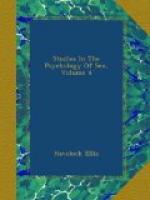more or less justly of indifference to bad odors.
They are very often, however, keenly alive to the
significance of smells and their varieties, though
it does not appear that the sense of smell is notably
more developed in savage than in civilized peoples.
Odors also continue to play a part in the emotional
life of man, more especially in hot countries.
Nevertheless both in practical life and in emotional
life, in science and in art, smell is, at the best,
under normal conditions, merely an auxiliary.
If the sense of smell were abolished altogether the
life of mankind would continue as before, with little
or no sensible modification, though the pleasures
of life, and especially of eating and drinking, would
be to some extent diminished.
In New Ireland, Duffield remarks (Journal of the Anthropological Institute, 1886, p. 118), the natives have a very keen sense of smell; unusual odors are repulsive to them, and “carbolic acid drove them wild.”
The New Caledonians, according to Foley (Bulletin de la Societe d’Anthropologie, November 6, 1879), only like the smells of meat and fish which are becoming “high,” like popoya, which smells of fowl manure, and kava, of rotten eggs. Fruits and vegetables which are beginning to go bad seem the best to them, while the fresh and natural odors which we prefer seem merely to say to them: “We are not yet eatable.” (A taste for putrefying food, common among savages, by no means necessarily involves a distaste for agreeable scents, and even among Europeans there is a widespread taste for offensively smelling and putrid foods, especially cheese and game.)
The natives of Torres Straits were carefully examined by Dr. C.S. Myers with regard to their olfactory acuteness and olfactory preferences. It was found that acuteness was, if anything, slightly greater than among Europeans. This appeared to be largely due to the careful attention they pay to odors. The resemblances which they detected among different odorous substances were frequently found to rest on real chemical affinities. The odors they were observed to dislike most frequently were asafoetida, valerianic acid, and civet, the last being regarded as most repulsive of all on account of its resemblance to faecal odor, which these people regard with intense disgust. Their favorite odors were musk, thyme, and especially violet. (Report of the Cambridge Anthropological Expedition to Torres Straits, vol. ii, Part II, 1903.)
In Australia Lumholtz (Among
Cannibals, p. 115) found that the
blacks had a keener sense
of smell than he possessed.




